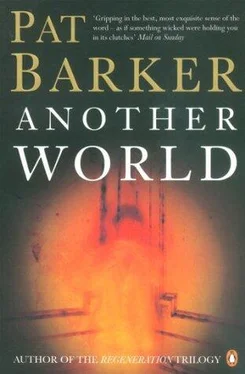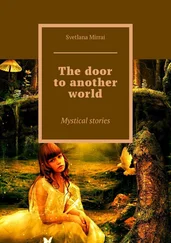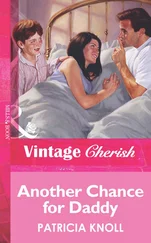‘Sweeney bloody Todd,’ says Geordie, not relishing the position, head held back, the razor hovering near his throat. He dries his chin himself. ‘There,’ he says accusingly, pointing at a tiny red stain on the towel.
‘I’ll put a plaster on it.’
‘You will not. I‘ll have some o’ yon pansy stuff you put on your chin.’
Will you indeed? Nick thinks, going to fetch his carefully hoarded bottle of Antaeus.
‘Jesus wept,’ Geordie says, sniffing it. ‘Smells like a French whore’s bedroom.’
He often said that in Nick’s teenage years, watching Nick getting ready to go out, desperate to impress some girl.
‘Were you ever in a French whore’s bedroom?’ Nick asks.
‘Never you mind.’
The doorbell rings. ‘I think that’s your date,’ Nick says, going to answer it.
Helen’s looking away from him down the street when he opens the door, so that for a split second he’s able to observe her before she turns to him and smiles. She’s wearing, instead of her usual jeans and T-shirt, an ankle-length dress made of some dark blue material, the crinkly stuff that doesn’t need ironing. He guesses she’s made a special effort for Geordie and likes her even better for it. When she turns to face him, he sees she’s carrying a big bunch of roses, not the cruelly wired formal drops of blood you buy in a florist’s, but floppy open-hearted blooms from the garden. He kisses her and the stalks wet the front of his shirt. ‘Come in.’
Geordie’s sitting up, incredibly erect, though a few minutes ago he’d been slumped over his swollen belly. The suspicious areas of brightness in his cheeks are more clearly marked than ever.
‘Hello, Geordie,’ she says, bending over Grandad and kissing him. ‘I’ve brought you these. I didn’t know whether to bring you beer instead.’
‘No, I don’t think I could face beer.’
They sit and chat. Unselfconsciously, Helen holds Geordie’s hand, his skin against hers speckled with the fall-out of old age, moles, brown spots, tags of flesh, a raised rough patch of something he needn’t worry about now. Her skin’s lighter, smoother, though even her hand, Nick notices, no longer has the unmarked firmness of youth. She must be nearer forty than thirty, and a woman’s hands age faster than the rest of her body. Around her wrists are lines where even a few years ago no lines would have been. ‘The bracelets of Venus.’ Nick dredges the phrase up rather proudly. Since he apparently goes round smelling like a French whore he may as well think like one as well. ‘Would you like a drink?’ he asks. ‘Wine? Or is it too early?’
‘Wine would be lovely,’ Helen says.
They’re chatting together easily and yet intently, still holding hands, and suddenly Nick realizes something that’s probably been staring him in the face for years. Geordie’s in love with Helen, in love with a woman sixty years younger than himself, hopelessly, helplessly and no doubt at times humiliatingly in love, and has been ever since he met her. This is why he’s achieved this minor resurrection from the dead. This is why it matters so much that he should be shaved and dressed, and that the house should not smell of his decaying body.
It seems only right, having had this perception, to leave them alone as long as possible. Nick opens and pours the wine, then withdraws to the kitchen and busies himself tidying up. He doesn’t want to think about what he’s discovered, doesn’t want to drag it through the rag and bone mill of his mind, he’s humbled by it and he knows that this is the right feeling.
Meanwhile the flow of conversation from the next room goes on, too low for him to distinguish individual words. When he finally rejoins them Helen’s leaning over Geordie giving him a kiss.
Hours, they’d spent together, taping his recollections of the war and the years that followed. Geordie was puzzled at first by the direction of her questions. He was so used to telling people about the trenches — that’s what they always wanted to hear — that it took him a while to understand that Helen was interested in the ways in which, over the years, he’s learned to manage his memories. Once he understood, he was interested in her theories, though he always denied that his memories had changed to accommodate changes in public attitudes to the war. ‘I wish they did change,’ he said, trying to get her to see the perpetual present in which his worst memories existed. Reading the transcripts, Nick had seen it clearly. The wordless, hallucinatory filmic quality of his memories. A flare goes up, illuminating bleached sandbags and tangled wire, but the trembling light never falls. A scream begins and never ends. For Helen, memories are infinitely malleable, but not for Geordie. Geordie’s past isn’t over. It isn’t even the past.
Grandad sips his tea. ‘Tastes of iron,’ he says to Helen, not complaining, merely making an observation. ‘It’s the pills.’ Then to Nick: ‘Can’t I have a drop of something stronger?’
Nick gives him a glass of brandy, pours more wine for himself and Helen. Geordie never could get a taste for white wine even at the best of times. ‘Virgin’s piss,’ he called it.
The wind blows rain against the window pane, a spattering of drops that makes Geordie jump. It grows rapidly dark, a storm closing in, the first signs of autumn. A leaf whirls down, and clings for a moment to the glass. Geordie grows more exhausted by the minute, though he’s reluctant to give in and let Helen go for what he must know will be the last time. Nick, seeing her now through Geordie’s eyes, thinks she would be easy to love.
At last Grandad’s had enough. Immediately Helen drains her glass. Nick realizes she doesn’t want Geordie to have to reveal his weakness by getting up while she’s still there and hobbling towards the stairs. Another kiss, this time on the mouth, and then she’s ready to go.
Outside, blinking in the rain, flushed from the wine though she’s only had two glasses, she says, ‘How long do you think he’s got?’
‘Not long.’
‘He doesn’t seem too bad. He’s better than I thought he would be.’
‘He was holding himself together for you.’
She kisses him and gets into her car. ‘Ring me.’
Going back inside, Nick finds, as he’d expected, that Geordie suddenly looks dreadful. The change from a few moments ago with Helen in the room is almost unbelievable. His cheeks are sunken, he won’t see Helen again, ever, and the knowledge is written all over him, in the defeated sag of his shoulders, in the way he allows himself to be half supported, half carried to the sofa, where he sinks back against the cushions, refusing even to think about the trek up the stairs. Bereavement’s nothing, Nick thinks suddenly, in comparison with the total loss, the absolute bereavement, experienced by the dying. He’ll go tonight, he thinks, then immediately disowns the thought. He’s said that the last three nights and Geordie’s still here.
After a while Geordie drifts off to sleep. Nick finishes the rest of the bottle and then, for good measure, has a brandy. He feels desperate, restless, phones Fran, has a word with Miranda, hears Jasper gurgling away in the background, feels they’re a million miles away. A good day in York, and Gareth didn’t cry when Fran left. ‘Did you?’ he asks. Long pause. ‘A bit.’
Geordie’s stretched out, looking more ill than ever, his mouth slightly open. Nick watches for the rise and fall of the thin chest beneath the shirt, and it’s a long time coming. He realizes he’s been holding his own breath and forces himself to breathe normally.
The wind howls down the chimney, hurls rain against the ‘window, chases drops diagonally across the pane. He remembers some childhood illness, fever, a sore throat, pain, and Grandad sitting on the bed beside him, watching individual trickles of rain race each other down the glass.
Читать дальше












